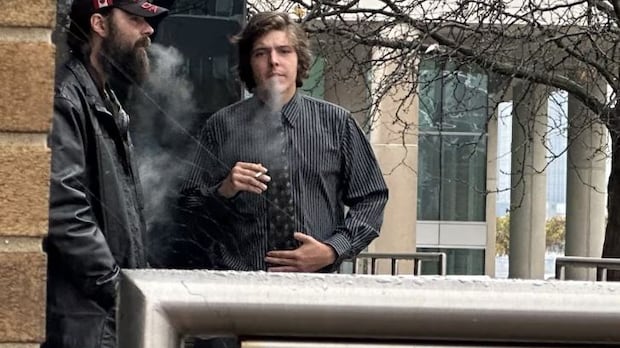Windsor man's statements to police about joining neo-Nazi group are admissible as evidence, judge rules
Seth Bertrand, 21, was recorded speaking to an undercover RCMP officer
A Windsor man's recorded conversations with RCMP about trying to join a neo-Nazi group will be used against him in his trial on a charge of terrorism.
A Superior Court judge ruled on Monday that things Seth Bertrand said to an undercover officer, and things he said to an officer after his arrest, are admissible as evidence.
"The circumstances by which the statement was (obtained) was not oppressive," said Justice Maria Carroccia.
Bertrand, 21, is facing a terrorism charge in relation to what RCMP allege were attempts to connect with a far-right hate group called the Atomwaffen Division — also known as the National Socialist Resistance Front.
Inspired by the writings of avowed U.S. neo-Nazi James Mason, the group promotes armed violence for white nationalist aims.
Canada listed the Atomwaffen Division as a terrorist entity in 2021.
RCMP allege that Bertrand submitted an online application in which he "offered his skills and commitment to do things" for the group.

In their investigation of Bertrand, RCMP carried out an elaborate months-long operation in which multiple undercover officers established relationships with him.
The operation eventually led to a recorded conversation in which Bertrand talked about his contact with the Atomwaffen Division and other extremist groups.
The court heard that, in the recording, Bertrand described his own position as one of "domestic terrorism," with a desire to become "weaponized."

RCMP arrested Bertrand on the terrorism charge in May 2022. While in custody, Bertrand told officers he was no longer involved in "that stuff," and that he only "tried to get in contact with them."
Bertrand has pleaded not guilty. His lawyer, Bobby Russon, argued that RCMP's undercover operation was equivalent to what's known as a "Mr. Big" police procedure — a co-ordinated, covert technique which case law warns can lead to unreliable confessions.
Russon further argued that after his client's arrest, RCMP violated Bertrand's rights by interviewing him without providing access to his choice of lawyer, and by not making him aware of the legal jeopardy of his statements.
But Carroccia disagreed.
The judge noted that the undercover operation involved no misconduct, abuse, or threat of violence, and that Bertrand was "comfortable" and "spoke freely."
Carroccia also noted that upon Bertrand's arrest, officers made reasonable attempts to contact Russon, and repeatedly asked Bertrand if he understood his situation.
Carroccia pointed out that, in the recordings, Bertrand can be heard denying public counsel, telling officers he knew his rights, and saying that "this is not my first rodeo."
"It appears that Mr. Bertrand understood the nature of the charges," Carroccia told the court.
Monday's ruling was on the voir dire portion of the trial, in which the court determines admissibility of evidence.
The trial is tentatively set to continue on Jan. 23. The verdict will be decided by judge alone.
Russon has advised the court of his intention to file for a "directed verdict" — an acquittal on the grounds that there is no evidence of an essential element in the charge.
Prior to Bertrand's arrest on the terrorism charge, he committed hate-motivated acts of vandalism in Windsor from February to May of 2021 — such as smashing a window at a trans support centre, as well as scrawling swastikas and slurs on the property.
Bertrand pleaded guilty to three counts of mischief and one count of inciting hatred in connection with the vandalism.


